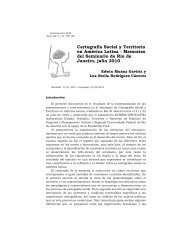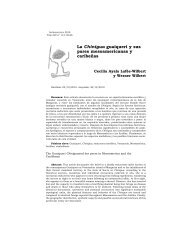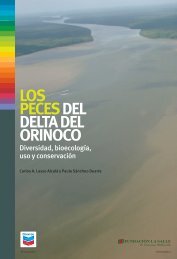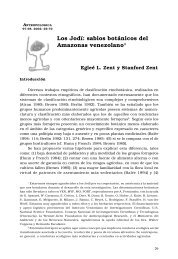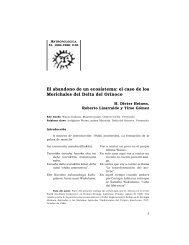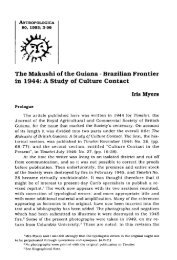War and a Semblance of Peace in the Inca Heartland
War and a Semblance of Peace in the Inca Heartland
War and a Semblance of Peace in the Inca Heartland
Create successful ePaper yourself
Turn your PDF publications into a flip-book with our unique Google optimized e-Paper software.
This situation does not seem to be motivated by a desire for l<strong>and</strong>, s<strong>in</strong>ce<br />
<strong>the</strong>re would have been little reason to return <strong>the</strong> l<strong>and</strong> if it had. Still, one <strong>of</strong> <strong>the</strong><br />
Jauja witnesses, Felipe Poma Macao, gave classic materialist reasons for<br />
territorial expansion:<br />
When one pueblo experienced a large expansion <strong>in</strong> its population, it<br />
would provoke wars with o<strong>the</strong>rs to take <strong>the</strong>ir chacaras [cultivated<br />
fields], foodstuffs <strong>and</strong> women… (f. 28v).<br />
We do not know how common it was to go to war over l<strong>and</strong>, but a number<br />
<strong>of</strong> witnesses mentioned it. Tak<strong>in</strong>g l<strong>and</strong> was usually accompanied by kill<strong>in</strong>g<br />
<strong>the</strong> people on it. As Don Felipe Poma Macao noted: “when some towns<br />
defeated o<strong>the</strong>rs, <strong>the</strong>y killed all <strong>the</strong> people <strong>and</strong> took over <strong>the</strong>ir l<strong>and</strong>s <strong>and</strong> <strong>the</strong>ir<br />
towns <strong>and</strong> divided <strong>the</strong>m up among <strong>the</strong>mselves <strong>and</strong> <strong>the</strong>ir capta<strong>in</strong>s, sett<strong>in</strong>g<br />
<strong>the</strong>ir own boundary markers” (f. 29). There is no real evidence that Andean<br />
people thought <strong>of</strong> l<strong>and</strong> as a commodity <strong>of</strong> any k<strong>in</strong>d, or even, as someth<strong>in</strong>g<br />
separable from <strong>the</strong> people who <strong>in</strong>habited it. In fact, everyth<strong>in</strong>g we know about<br />
<strong>the</strong> relation <strong>of</strong> people to <strong>the</strong> l<strong>and</strong>scape -<strong>the</strong> rocks, spr<strong>in</strong>gs <strong>and</strong> o<strong>the</strong>r natural<br />
features associated with it- suggests that people were firmly rooted to <strong>the</strong>ir<br />
territories. Kill<strong>in</strong>g everyone may have been <strong>the</strong> only means <strong>of</strong> break<strong>in</strong>g this<br />
bond.<br />
On <strong>the</strong> o<strong>the</strong>r h<strong>and</strong>, kill<strong>in</strong>g everyone may have been a means <strong>of</strong> prevent<strong>in</strong>g<br />
retaliation. Only one witness mentioned revenge as part <strong>of</strong> <strong>the</strong> cycle <strong>of</strong><br />
conflict, however. Baltasar Guaman Llamoca, from <strong>the</strong> prov<strong>in</strong>ce <strong>of</strong> Soras (<strong>in</strong><br />
<strong>the</strong> highl<strong>and</strong>s south <strong>of</strong> Ayacucho) expla<strong>in</strong>ed what happened after a successful<br />
raid:<br />
When some people defeated o<strong>the</strong>rs, <strong>and</strong> <strong>the</strong> defeated people fled,<br />
<strong>the</strong> w<strong>in</strong>ners arrived <strong>in</strong> <strong>the</strong>ir town <strong>and</strong> took <strong>the</strong>ir wives, women,<br />
cloth<strong>in</strong>g, livestock <strong>and</strong> everyth<strong>in</strong>g <strong>the</strong>y could f<strong>in</strong>d <strong>and</strong> left. When<br />
<strong>the</strong> people from that town returned, <strong>the</strong>y made alliances with o<strong>the</strong>r<br />
groups <strong>and</strong> went to war aga<strong>in</strong> over what had been taken from <strong>the</strong>m<br />
(f. 45).<br />
This situation sounds like <strong>the</strong> o<strong>the</strong>r side <strong>of</strong> <strong>the</strong> co<strong>in</strong> <strong>of</strong> <strong>the</strong> one described<br />
above -<strong>in</strong> this <strong>in</strong>stance <strong>the</strong>re was no <strong>in</strong>tention <strong>of</strong> restor<strong>in</strong>g what had been<br />
taken. It should also be noted, <strong>the</strong> conflict was not over l<strong>and</strong>.<br />
Fight<strong>in</strong>g for <strong>the</strong> sheer purpose <strong>of</strong> tak<strong>in</strong>g spoils -what we could call<br />
raid<strong>in</strong>g- can have been an end <strong>in</strong> itself. It was also <strong>the</strong> result <strong>of</strong> a successful<br />
campaign that may have been motivated by o<strong>the</strong>r reasons. Two witnesses<br />
describe <strong>the</strong> division <strong>of</strong> spoils. One was Juan Chancavilca, from Par<strong>in</strong>acochas<br />
(<strong>in</strong> <strong>the</strong> highl<strong>and</strong>s south <strong>of</strong> Ayacucho), who noted that <strong>the</strong> c<strong>in</strong>checona divided<br />
<strong>the</strong> spoils among all those who had participated, <strong>and</strong> did not just keep it all<br />
for <strong>the</strong>mselves (f. 52). The o<strong>the</strong>r Par<strong>in</strong>acochas witness, Alonso Quia Guanaco,<br />
said <strong>the</strong> same th<strong>in</strong>g (f. 50).<br />
195



